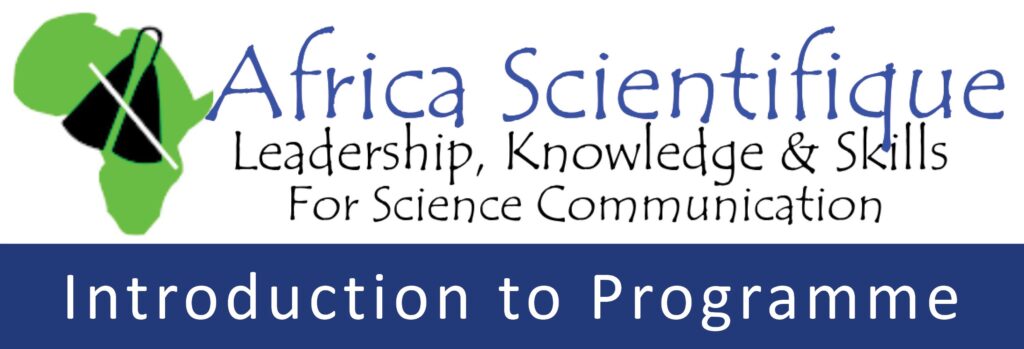On 25 February 2022, AIMS House of Science, in partnership with African Gong, introduced the 2022 Africa Scientifique Programme (AS) programme to the third cohort of AIMS Master’s students. The first two AS programmes were delivered at AIMS in 2020 and 2021. AS is a unique capacity-building programme designed to support and provide young and emerging African scientists, researchers and academics with Leadership, Knowledge and Skills for impactful Science Communication. The programme is delivered in three phases: the AS Introductory Workshop, the three-day AS Workshop and then six-months Post-Workshop mentoring and project activities.
The purpose of the Introductory Workshop (delivered online) was to inform participants of the background and rationale behind the AS programme and its transformational pan-African contexts. It also elaborated empowering perspectives and the envisaged outcomes for participants, and the recruitment processes. Dr Mpfareleni Rejoyce Gavhi-Molefe, AIMS’s House of Science Manager and Dr Elizabeth Rasekoala, the President of Africa Gong, facilitated the session. Mr Cebolenkosi Ngema, a graduate Data Scientist at Derivco PTY LTD and Africa Scientifique Programme 2020 alumnus contributed to the session as a role model.
Mr Ngema shared his challenges with regard to undertaking science communication and public engagement activities before attending the AS programme. He further alluded to how participating in the 3-day Workshop and Science Communication Project six-month Post-Workshop impacted his self-confidence and career progression. He encouraged the students to leverage the AS Programme offered to them.
Dr Gavhi-Molefe shared her science communication journey as a researcher in mathematics, the challenges she had encountered and the benefits she has achieved. She highlighted that lack of capacity building and mentorship programmes for science communication in South Africa were the main challenges for her. She encouraged participants to take science communication seriously so that they could become well-rounded graduates equipped with both the technical and transferable soft skills required to meet the pressing developmental challenges facing the African continent.
Dr Rasekoala presented an overview of the strategic background and rationale behind the AS programme development. She outlined that the AS programme had been conceptualised and framed to meet the critical needs of, and to upgrade the poor skills, knowledge, motivation and expertise of African researchers, academics, and science communicators, thus, contributing to the growth of science communication across the African continent. Dr Rasekoala further highlighted the benefits of engendering science communication skills in graduate students and researchers. She elucidated and framed Science Communication and Public Engagement actions, practices and drive as dynamic transformational tools for Post-AIMS career advancement and progression across critical parameters, such as work-life balance and successful research outcomes; interpersonal skills and professional ethos, relationships, and engagements; and empowering networking skills.
Special thanks to Mr Musawenkosi Elvis Khulu (structured Master’s student & House of Science volunteer) for chairing the event.
What’s next?
The second phase of the AS programme – a three-day intensive and interactive workshop – will take place on 11 to 13 April 2022 at the AIMS Main Lecture Hall room. This is an exciting, unique opportunity for the participants to continue their journey and delve deeper into the world of science communication/public engagement and the potential leverages that it can engender for their career advancement. Participants will have an opportunity to reflect on their career journey as aspiring mathematical scientists. They will also be challenged to recognise the critical role that they can play in the transformation of the African continent. A key outcome of the three-day workshop will be that the participants will have to conceptualise and pitch a specific science communication/public engagement activity that they will undertake over a six-month period (after the AS Workshop) to put into practice the knowledge and skills gained from the workshop. During this period, participants will be mentored and supported in planning, delivering and monitoring and evaluating their public engagement activities. While some students will carry out these projects in their home countries, some of these will be implemented in Cape Town.

